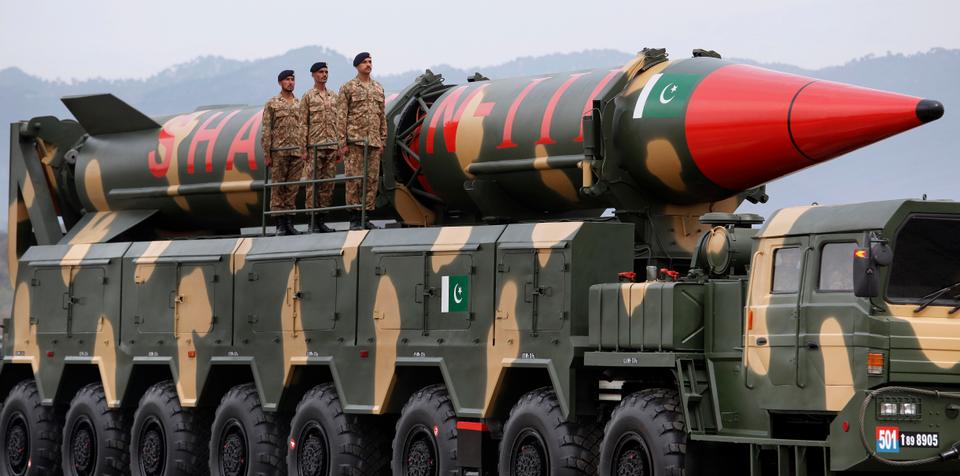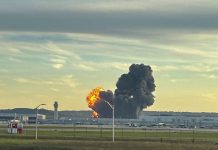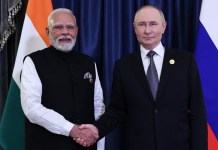A war erupts between Pakistan and India in year 2025 after severe clashes on the Line of Control (LoC). India retaliates by sending tanks into Pakistan administered Kashmir. Fearing it will be overrun; Pakistan hits the invading forces with its battlefield nuclear weapons, triggering the deadliest conflict in history – and catastrophic global cooling, with temperatures not seen since the last Ice Age.
It comes at a time of renewed tensions between the two South Asian rivals, which have fought several wars over Jammu and Kashmir and are rapidly building up their atomic arsenals. They currently each have about 150 nuclear warheads at their disposal, with the number expected to climb to more than 200 by 2025.
#BoycottMalaysia Trends In India After Malaysian PM Says India Invaded Kashmir
“Unfortunately it’s timely because India and Pakistan remain in conflict over Kashmir and every month or so you can read about people dying along the border,” said Alan Robock, a professor in environmental sciences at Rutgers University, who co-authored the paper in Science Advances.
India has a “no first strike” policy but reserves the right to mount a nuclear response to any hit by weapons of mass destruction. Pakistan has declared it would only use nuclear weapons if it could not stop an invasion by conventional means or were attacked first with nuclear weapons.
The authors wrote that although their scenario had Pakistan pulling the trigger first, they did not mean to imply they believed this was more likely.
Based on their current populations and the urban centres that would be likely targeted, the researchers estimated up to 125 million could be killed if both countries expended the bulk of their highest yield weapons.
Around 75-80 million people were killed in World War II. This most extreme scenario would involve the use of 100 kilotonne weapons, more than six times as powerful as the bombs dropped on Hiroshima.
A single airburst from such a bomb could kill two million people and injure 1.5 million – but most of the deaths would occur from the raging firestorms that followed the blast.
“India would suffer two to three times more fatalities than Pakistan because, in our scenario, Pakistan uses more weapons than India and because India has a much larger population and more densely populated cities,” the paper said.
As a percentage of its urban population, though, Pakistan’s losses would be about twice those of India. But nuclear Armageddon would be only the beginning.
The research found that the firestorms could release 16 million to 36 million tonnes of soot (black carbon) into the upper atmosphere, spreading around the world within weeks. The soot, in turn, would absorb solar radiation, heating the air up and boosting the smoke’s rise.
US Fears Pakistan-Sponsored Terror Attacks In India Over Kashmir Dispute
Sunlight reaching the Earth would decline 20 to 35 per cent, cooling the surface by 3.6 to 9 degrees Fahrenheit (2 to 5 degrees Celsius) and reducing precipitation by 15 to 30 per cent. Worldwide food shortages would follow, with the effects persisting up to 10 years.
“I hope our work will make people realize you can’t use nuclear weapons, they are weapons of mass genocide,” said Robock, adding the paper lent more evidence to support the 2017 UN Treaty on the Prohibition of Nuclear Weapons.
Renewed Tensions
It comes at a time of renewed tensions between the two South Asian rivals, which have fought several wars over the Muslim-majority territory of Kashmir and are rapidly building up their atomic arsenals.

Last week Pakistan PM Imran Khan, speaking at UN General Assembly, warned there could be a repeat of the fighting between the regional rivals seen in February if India blamed his country for a homegrown militant attack in response to the ongoing crackdown in disputed Kashmir.
“If a conventional war starts between the two countries, anything could happen. But supposing a country seven times smaller than its neighbour is faced with the choice: either you surrender, or you fight for your freedom till death,” Khan said.
“What will we do? I ask myself these questions. We will fight … and when a nuclear-armed country fights to the end, it will have consequences far beyond the borders,” warned Khan, whose speech was punctuated by applause, mainly by the Pakistani delegation but at times others.




